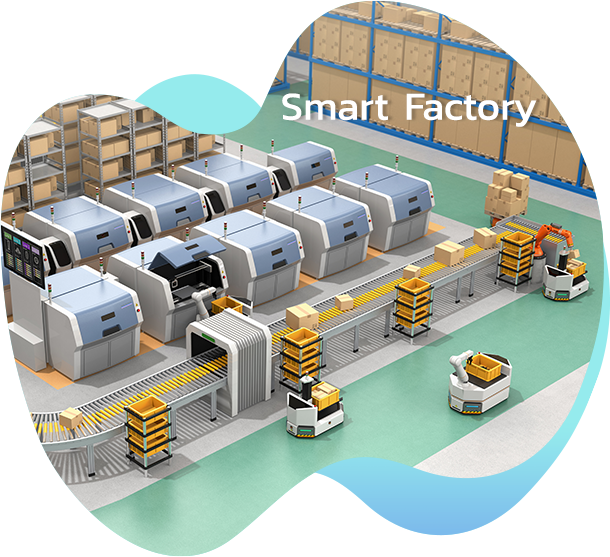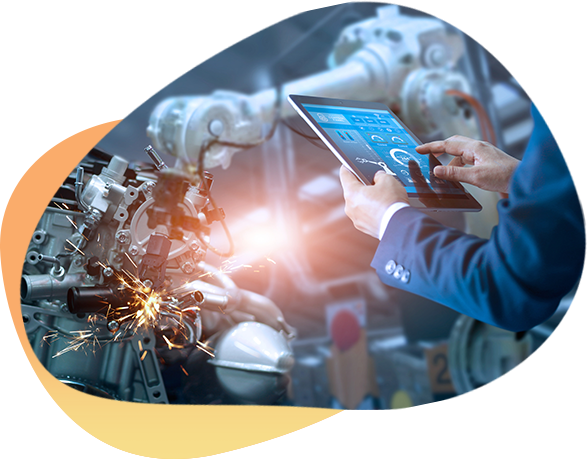Target Industries
Industry 4.0
Thailand has continuously been a world’s leading production base from large foreign companies especially in automotive and electronics industries due to the low cost of labor. However, Thailand is lack of opportunity to learn and develop its own advance production technology. Know-how, automation machinery, robotic, or production process are mainly import from foreign counties. The country, therefore, cannot shift toward self-sufficient technology country as there are limitations in production technology development abilities.

The development of country’s basic infrastructure to develop production technology toward industry 4.0 is a major stepping stone. The more production technologies developed, the greater opportunity for Thailand to develop innovation products as the entrepreneurs can pursuit local production technology, which is more compatible to local context. It is also less complex co-operation or co-working with technology provider with less time consume, more effective, and at lower cost compared to technology licensing from abroad.
Industrial Technology 4.0 Roadmap

The Thai Government is driven Thai industry toward Industry 4.0, which is the phase where industrial-related activities are linked with internet (Internet of Things) for example procurement, production system, production tools and equipment, maintenance, as well as logistics and raw materials are all ready to correspond to such system. Development and advancement in automation system, robotics, and smart electronics are key technologies to all major industries in order to transform to the government’s Industry 4.0 policy.
To response to the Industrial 4.0 policy, EECi has set a roadmap for technology development for modern manufacturing with aims to support smart industry development that will enhance traditional manufacturing technology to reach the Industry 4.0 model. Reducing the burden of investment for the entrepreneur will be the major stepping stone for large entrepreneur as a key exterminator for industry requirements to jointly work with technology developer or technology service provider in cooperation with research institutes and academics, and also initial technology owner from abroad, in order to mutual develop production technology. It is a win-win situation as large companies benefit from advanced technology at suitable cost and match with their requirements, while small entrepreneur see a clear demand of the large companies, which can reduce risk from developing a product or service that may not commercially successful.
To drive the roadmap, EECi will develop science, technology, and innovation infrastructure such as
- Advanced Industrial Robotics/Smart Machine Fabrication Lab
- Advanced Robotics and Factory 4.0 Testbed/Sandbox/Living Lab
- Industrial Additive Manufacturing Pilot Production
- Learning Factory for Workforce Reskilling
- Advanced Electronics Design for Industry 4.0
- Industrial IoT Sensors Development
- Augmented/Virtual Reality for Industry
- AI for Industry

Smart Electronics
Smart Electronics is electronic devices equipped with intelligent and smart system with multi-function feature (data measure and examine, gather, evaluate and inform accurately and promptly) using embedded system and sensor technology. Market trend and consumer preferences for the smart electronics is toward small and light devices that more portable and low-power consumption. The technology required easy and simple installation process to encourage more application in other business and industry such as smart farming system which sensors are installed to monitor crops environment including temperature, humidity, pH level of soil for agricultural industry; or wearable smart electronics devices to track wellness of man and can alert and assisting life before it happen. The support growth in smart electronics industry, it is necessary to promote local use which will encourage research, development, and manufacturing of high performance smart electronics devices. This will lead to development in smart and sustainable tourism, development in telecommunication to support community enterprise, small- and medium- smart enterprise, smart factory, and smart medical and public health system with more efficiency and accessibility. In parts of endpoint device technology, it is to support research and innovation for low cost devices such as smart phone to widely extend consumer affability of commercial smart electronics.
In response to such roadmap, EECi will strive to develop such science, technology, and innovation infrastructure as
- Support and development of embedded system to sustain local industries and meet local and international standards.
- Support and development of autonomic sensor devices to increase efficiency such as in real-time data measure and real-time data transmission features in order to enhance production efficiency and added value to the local industries.
- Support the development in Smart Farm, Smart Factory, Smart Service, and Smart Health using smart electronics to enhance production efficiency and added value to the local industries.
- Support the development in IoT technology to successfully move forward the local industries toward Industry 4.0.









